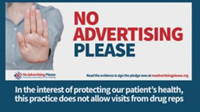 |
| An Australian group of doctors and academics launched the 'No Advertising Please' campaign to push to end of doc-rep interactions.--Courtesy of No Advertising Please |
When it comes to interactions between doctors and pharmaceutical companies, there's a growing desire for transparency among those concerned that reps influence prescribing habits. Just last week, the U.S. launched a database with info from the Physician Payment Sunshine Act, detailing all pharma payments made to healthcare professionals.
But an Australian group of doctors and academics wants to take it one step further: With an aptly titled "No Advertising Please" (NAP) campaign, it's pushing to end doc-rep interactions altogether.
The effort calls on doctors to make a pledge not to see drug company sales reps and display a sign outside their offices that says just that, Australia's ABC reports.
"The pharmaceutical representatives are essentially marketing drugs, and what we're after is doctors deciding which drug is best based on the best evidence, as opposed to their best marketing," campaigner Dr. Justin Coleman told the news service.
But the way the Australian Medical Association (AMA) sees it, drug companies make valuable contributions, both monetary and otherwise, to the medical world.
"Our world revolves around education and information and the pharmaceutical companies are an important source of money for research, so every Australian will benefit from that research and pharmaceutical promotion," AMA rep Dr. Brian Morton told ABC.
Other objectors share some of the same views held by those who caution not to put too much stock into Sunshine Act numbers. How much influence can drug reps actually have on highly educated physicians? critics have asked. Morton, for one, called the NAP campaign "insulting to doctors" and "also rather naïve."
Yet more and more doctors, for a variety of reasons, are starting to side with NAP, putting the pressure on pharma marketers to find different ways to get their messages across. According to a recent report from ZS Associates, almost half of all doctors bar pharma reps in some way. And some studies have shown that doctors are indeed influenced by relationships with reps--enough to change their prescribing habits.
- get more from ABC